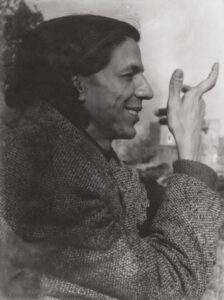Translated by LISA MULLENNEAUX

Photo courtesy of Archives Bouanani
This country
My country is this horizon with blank pages
where I see skeletons of broken children
wandering, begging for the light of thin wisps
of stories that might finally appease them
In hands the color of amaranth magic
they hold hippogriffs like dogs
a talisman to protect themselves from the lover
with hair braided into black shapes
All evening every evening until old age
under the ocean of sky under the constellations
they will come to shed the blood of their distress
and celebrate their death in sad ablutions
My country where ancestors with pagan joy
marauded in songs and paradises
Their white horses drank from a thousand fountains
of sanctity and love Who would have told us
Was it the March wind or their poems
War ships had destroyed their horizons
so appalling hypocrisies could triumph
Our bestiary deserted our homes
Horsemen of the past facing our windows
still speak to us about the lights of the fields
and living legends that gave birth
in our breasts to strange setting suns
Ce pays
Mon pays est cet horizon aux pages blanches
J’y vois errants des squelettes d’enfants brisés
mendiant sur des lumières de maigres tranches
de contes qui pourraient enfin les apaiser
Entre leurs mains couleur de magie amarante
ils tiennent des hippogriffes comme des chiens
un talisman pour se protéger de l’amante
à la chevelure tressée de noirs desseins
Les soirs tous les soirs et jusqu’à la vieillesse
sous l’océan du ciel sous les constellations
ils viendront déverser le sang de leur détresse
et fêter leur mort en tristes ablutions
Mon pays où les ancêtres aux joies païennes
maraudaient dans des chansons et des paradis
Leurs chevaux blancs s’abreuvaient aux mille fontaines
de la dulie et de l’amour Qui l’aurait dit
Etait-ce le vent de mars ou leurs poésies
Des destroyers avaient détruit leurs horizons
pour le règne d’effroyables hypocrisies
Notre bestiaire déserta nos maisons
Les cavaliers d’autrefois face à nos fenêtres
nous parlent encore des lumières des champs
et des légendes vivantes qui faisaient naître
dans nos poitrines d’étranges soleils couchants
Wild Miniatures
I was born in the kingdom of false memories
in the margins of long-forgotten manuscripts
While elsewhere soldiers drunk on looting
raised bloody garrisons on the mountains
camels and dogs gone wild
cheerfully trampled the horizons
Soon there was no one in the villages
except old men old women and little kids
The dying men called the storms
The old women sang of new tomorrows
War famine then war again
and the amnesia of many generations
as in dawn dreams as in Gomorrah
where plantations have long since died
Kids in the heart of torrid autumns
buried Satan the angels and the seasons
Their ghostly features cracked with wrinkles
they vanished above new houses
I was born very early there and learned to believe
that angels left us on the doorstep of latrines
left us to our pitiful history
the only orphans unworthy of antiquity.
Miniatures sauvages
Je suis né au royaume des fausses mémoires
en marge des manuscrits longtemps oubliés
Tandis qu’ailleurs les soldats ivres de pillages
dressaient sur les monts de sanglantes garnisons
Les chamelles et les chiens devenus sauvages
piétinaient allègrement les horizons
Bientôt il n’y eut personne dans les villages
que des vieux des vieilles et des petits gamins
Les vieux agonisant appelaient les orages
Les vieilles chantaient de possibles lendemains
La guerre la famine puis la guerre encore
et l’amnésie de plusiers générations
comme dans les rêves d’aube comme à Gomorrhe
où sont mortes depuis longtemps les plantations
Les gamins eux au coeur des automnes torrides
enterraient Satan les anges et les saisons
Leurs traits fantômatiques lézardés de rides
s’effaçaient au-dessus de nouvelles maisons
Là je suis né très tôt et j’ai appris à croire
qu’au seuil des latrines les anges nous quittaient
pour nous laisser à notre pitoyable histoire
seuls orphelins indignes de l’Antiquité.
The filmmaker and writer Ahmed Bouanani (1938–2011) was born in Casablanca. When Bouanani was 16, in the final days of the French colonial era, his father, a police officer, was assassinated, a tragedy that the artist returned to in his work again and again. Bouanani studied film at the Institut des hautes études cinématographiques (IDHEC) in Paris for three years before returning to Morocco, where he directed several classics of North African cinema. He published three poetry collections during his lifetime, as well as the novel The Hospital. Bouanani’s generation of artists and intellectuals were persecuted and tortured by King Hassan II’s government for celebrating a national culture long suppressed by the French. The poet honors “the ancestors,” “the horsemen of the past” and their oral traditions over the king’s official history. Given the imprisonment of his fellow poets, Bouanani was reluctant to publish his written work and was known mainly for his films, yet they, too, were censored.
Lisa Mullenneaux specializes in the translation of modern French and Italian poets, such as Louis Aragon, Maria Attanasio, Alfonso Gatto, and Giovanni Giudici. She also reviews books in translation for the Harvard Review, Women’s Review of Books, and World Literature Today. She is the author of the critical study Naples’ Little Women: The Fiction of Elena Ferrante and has taught research writing for the University of Maryland’s Global Campus since 2015. More at lisamullenneaux.com.

